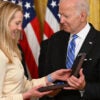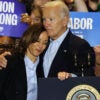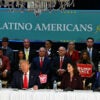The United Kingdom’s Labor Party and Kamala Harris’ presidential campaign may be marching into the same legal jeopardy as the Australian Labor Party and Bernie Sanders’ campaign for president did in 2016: violating federal law that bans foreigners from financial involvement in American political campaigns.
Various news sources report that Sofia Patel, head of operations for the Labor Party in the U.K., is recruiting members to campaign for Harris in swing states such as North Carolina, Nevada, and Pennsylvania.
As a former member of the Federal Election Commission, the agency responsible for civil enforcement of federal campaign finance laws, I can tell you that the law on this is quite clear: 52 U.S.C. § 30121 prohibits any foreign national from making “a contribution or donation of money or other thing of value” in connection with a federal, state, or local election.
As the FEC’s website explains, that ban doesn’t prevent a foreigner from participating in “campaign activities as an uncompensated volunteer” although even as a volunteer, the foreigner cannot “participate in the decision-making process of the campaign.”
But this also means that if the members of the U.K. Labor Party who are interfering in our 2024 election process aren’t really volunteers, then Patel, her party, and the Harris campaign are potentially in a lot of trouble.
If Patel and the Labor Party are paying any expenses for party members, including travel costs to get to the U.S. or any kind of salary or stipend, then they are violating the law.
And if the Harris campaign accepts their help, then the campaign also is violating the law.
That is exactly what happened in 2016 to the Australian Labor Party and Sanders’ campaign for the U.S. presidency.
As the 2018 agreement to settle the enforcement action (MUIR 7035) filed by the FEC against the Labor Party explains, the Sanders campaign accepted “seven delegates” from the Aussies to work in four locations. These individuals were part of “an international program that sends delegates around the world to engage with progressive, social democratic, and Labor parties,” the document says.
The so-called volunteers not only had travel expenses covered by the Australian Labor Party, they received a stipend from the party. In other words, they were being paid by the Australian Labor Party to work for the Sanders campaign.
Those payments constituted a “prohibited in-kind foreign national contribution in violation of” federal law, as the settlement agreement outlines.
The Australian Labor Party claimed that the purpose of the program “was to learn best practices and skills in progressive policy and campaign development” and that the party “did not intend to influence any election.”
That claim obviously doesn’t pass the laugh test.
In order to settle the case, the Australian Labor Party agreed to pay a civil penalty to the FEC of $14,500 and to “cease and desist” from violating federal law.
The Sanders campaign—“without admitting liability”—agreed to pay a similar civil penalty of $14,500 and to stop violating the law.
Why? Because it is also a violation of the law for a campaign to accept a foreign financial donation or in-kind contribution. By accepting the assistance of foreign-paid staffers, the Sanders campaign broke federal law.
By the way, even if the U.K. Labor Party were to work independently of the Harris campaign without any coordination or communications between them, it still potentially would violate the law. An FEC regulation, 11 CFR 110.20, explains that foreign nationals also are banned from making any “independent expenditure, or disbursement in connection with any federal, state, or local election.”
It seems a bit far-fetched to believe that the U.K. Labor Party would send “volunteers” to the U.S. without paying their way, or that these volunteers would know what to do in a foreign country without any communications or coordination with the campaign they are here to assist.
But even if that is true and the foreign nationals are engaging only in independent campaign expenditures, they are still breaking the law.
In any event, the U.K. Labor Party is going down a dangerous road that may result in legal action against it.
Apparently, the party hasn’t learned the lesson from its brethren in Australia, who discovered that interfering in a U.S. election has consequences. Patel, as the party’s operations chief, might want to give the Aussies a call.
The Harris campaign should publicly reject this assistance and inform the U.K. Labor Party that its members aren’t welcome to play in American politics.
Otherwise, the vice president’s campaign will be saying that it welcomes foreign interference in our election process—as long as it’s progressive interference that helps Harris’ side of the political aisle.
Hans von Spakovsky is a senior legal fellow at The Heritage Foundation, but Heritage is named in this commentary for identification purposes only. The views expressed are the author’s own and don’t reflect an institutional position either for Heritage or its Board of Trustees.





























